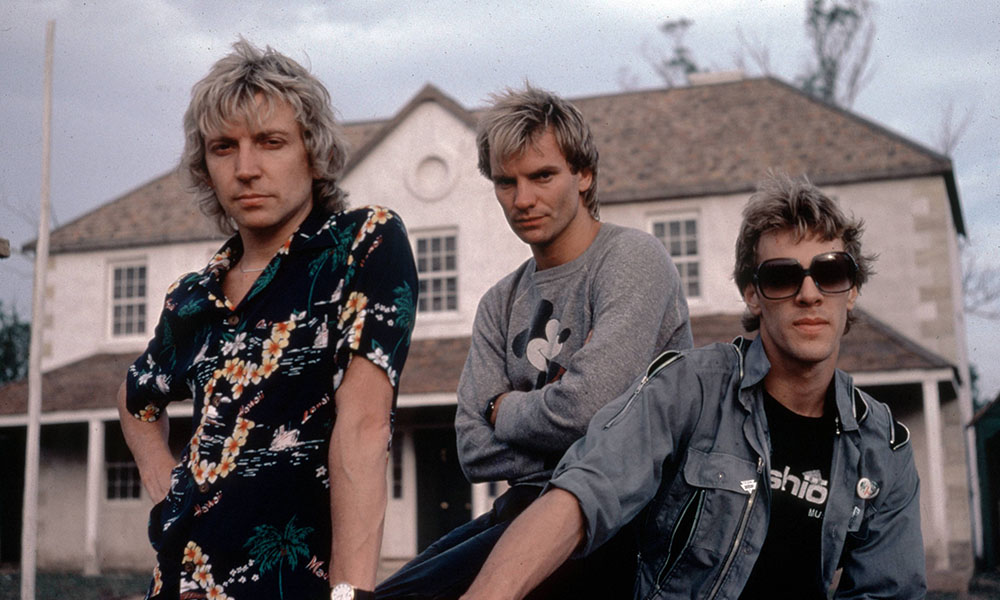The Police started with a casual hello at a gig in Newcastle back in 1976. Sting, then a teacher who moonlighted as a bassist in a local jazz band, went to check out English prog-rock act Curved Air. He and the drummer, Stewart Copeland, got to talking, and they exchanged numbers before Sting left the venue. The next time Copeland heard from him, Sting had left Newcastle for London, where punk was exploding and wafts of New Wave – a sub-genre melding elements of pop, punk, electronic, and rock’n’roll – had started to materialize. One jam session beget another, and soon the duo rounded out their rhythm section with a guitarist, Andy Summers.
What emerged was an inventive powerhouse of a pop-rock outfit that won fans over at an exponential rate. Their debut album, 1978’s Outlandos d’Amour, had it all. Throat-shredding screams perfect for the mosh pit were present (especially on “Roxanne,” which had Sting stretching his vowels to the point of contorting them). But so were tight arrangements, octave-leaping harmonies, and a penchant for pursuing musical fusion. The group specialized in reinterpreting the sounds they loved. They managed to scruff up the sunniest of chord progressions without reducing them to saccharine, a quality they’d maintain through the 80s, which saw them release six songs that reached the Top 10 of the Billboard Hot 100 chart and build a global following.
By the time they released Synchronicity, their fifth and final album, The Police had become one of the bands that served not only as champions of New Wave, but one of the most compelling acts of the 80s.
Below, we walk through some of their most transformative songs, from their early singles to the hits that earned armfuls of Grammys and a place in the Rock & Roll Hall of Fame.
Listen to the best songs by The Police on Apple Music and Spotify.
The Definitive Hits
(Don’t Stand So Close to Me; Every Little Thing She Does Is Magic; King of Pain; Every Breath You Take)
The Police were enormous chart successes during their run. It wasn’t immediate though. “Don’t Stand So Close to Me,” the first single off Zenyata Mondatta, was their first Top 10 hit. One listen to the song, which begins with a cinematic build-up worthy of any major hero-in-training montage before exploding into one of the most danceable choruses they’ve ever written, and you’ll understand why. In 1981, “Every Little Thing She Does Is Magic” followed in all its romantic, cloud-grazing glory to No. 1 on the UK charts and No. 3 on the Billboard Hot 100. “King of Pain” rose to the same level two years later on the strength of its meditative synths and dramatic crescendo. It’s one of The Police’s best songs: Summers riffing away, Copeland setting the pace, and all three nailing their harmonies at the top of their vocal ranges.
The group’s biggest hit was “Every Breath You Take,” the consummate slow-burner that delivered not only a No. 1 hit in their native UK, but in the US as well – their only single to do so. In addition to a chart reign that lasted eight weeks, “Every Breath You Take” won big at the 1983 Grammy Awards, where it took home the honors for song of the year and best pop performance by a duo or group with vocals. The song has enjoyed a second life across popular culture, and was notably sampled by Puff Daddy in his 1997 tribute to The Notorious B.I.G., “I’ll Be Missing You.”
The Introductory Statement Singles
(Fall Out, Next to You, So Lonely, Can’t Stand Losing You, Roxanne)
If you’re looking for a track to drag you into the dank and beer-damp clubs that The Police played on the come-up, you’ll find it in the jangly guitar chords and Sting’s wails on “Fall Out.” (The track served as The Police’s debut single in 1977.) “Next to You,” the song that kicks off 1978’s Outlandos d’Amour, their debut album, is an excellent choice as well: Copeland’s drumming is surgically precise, and Sting gives his unhinged, rock star-in-training best before Copeland and Summers join him in three-part harmony on the chorus.
Ska and reggae were making waves throughout England at this point, and Sting incorporated his adoration for the West Indian genre into the paradoxically invigorating “So Lonely,” which has him embracing an undulating Caribbean rhythm with his bass line – a choice he’d later reveal was inspired by writing lyrics over the melody of Bob Marley’s “No Woman No Cry.” That reggae influence carried over into the controversial “Can’t Stand Losing You.” Sting speaks candidly of suicide in the lyrics, and the cover art – which featured Copeland with a noose around his neck, standing atop a melting ice block – prompted a ban from the BBC. The song nonetheless became their first to hit the UK charts.
Perhaps the best song of The Police’s first recorded effort, though, is “Roxanne,” which is so beloved it’s been written into award-winning films (who can forget the “El Tango de Roxanne” from Moulin Rouge!?). It was barely a blip upon its release, but was the game-changer that launched the Police’s career on an international level: this was the tune that won over Stewart’s brother, the record executive Miles Copeland, who signed on as their manager and scored them a deal with A&M Records after he heard it.
The New Wave Standouts
(De Do Do Do, De Da Da Da, Invisible Sun, Spirits in the Material World)
The best Police songs always seem to have that metallic delay from Andy Summers’ guitar. It was a sound that became a defining element of New Wave. Listen closely for it on “De Do Do Do, De Da Da Da,” a simple confection and one where Summers shines throughout. “Spirits in the Material World,” the leadoff track on 1981’s Ghosts in the Machine, once again turns to reggae syncopation while working vibrant synths into the mix, a rarity for Sting up to that point.
Experimentation swells in surreal degrees throughout the album, which comes to a stunning head on “Invisible Sun.” Inspired by The Troubles, Sting wanted to acknowledge the tumult in Ireland while stressing that it would eventually come to an end (“There has to be an invisible sun / That gives us hope when the whole day’s done”). The contrast between “De Do Do Do, De Da Da Da” and “Invisible Sun” is profound, but it clearly indicates the variability The Police brought to New Wave. They could make any standard chord progression or sentiment sound like a musical message from the future.
The Genre-Benders
(Message in a Bottle, Walking on the Moon, Driven to Tears, Tea in the Sahara)
Reggae courses through The Police’s entire discography, but it was a shaping force of the best songs on their 1979 album Regatta de Blanc especially. Its first single, “Message in a Bottle,” is a perfect mix of New Wave and reggae. This musical meld resonated with listeners, who not only landed the Police their first No. 1 hit but also adored “Walking on the Moon,” which played with a similarly moody cadence and rhythmic flow.
Zenyatta Mondatta featured “Driven for Tears,” Sting’s pensive response to reports of starving children and extreme poverty he’d seen on the news, and the track serves as his first political anthem. (He’d go on to perform it at the epic Live Aid benefit concert in 1985.) Sultry throws to Sting’s love of jazz abound, too, but “Tea in the Sahara” is a standout lounge number: it’s sparse and slow, a stark foil to the kinetic singles that defined the group’s early output.
The Synchronicity Smashes
(Synchronicity I, Synchronicity II, Wrapped Around Your Finger, Murder By Numbers)
The Police certainly went out with a bang, and a personal best at that: Synchronicity, named after psychology trailblazer Carl Jung’s theory, was their only studio album to hit No. 1 on the Billboard 200 albums chart. It not only yielded “Every Breath You Take,” but the chaotic “Synchronicity I” and futuristic “Synchronicity II,” companion tracks that took a hard left into electronic territory with galloping beats and a deluge of synths.
Synchronicity is more varied and eclectic than any Police album. What do you call the smoldering “Wrapped Around Your Finger”? Perhaps it’s easiest just to say pop music – especially considering it became yet another top 10 hit for the group. Album closer “Murder By Numbers” is a sly, campy change-up, their version of a film noir theme that pops with Copeland’s drumming and Summers’ slightly off-kilter chords. All in all, a fine final showing that scored them the Grammy for best rock performance from a duo or group in 1984.
Think we missed one of the best songs by The Police? Let us know in the comments below.




